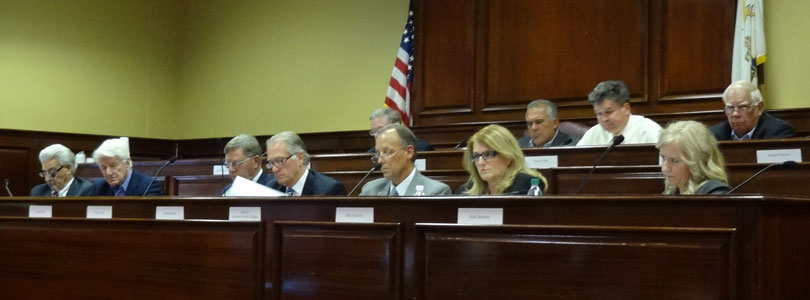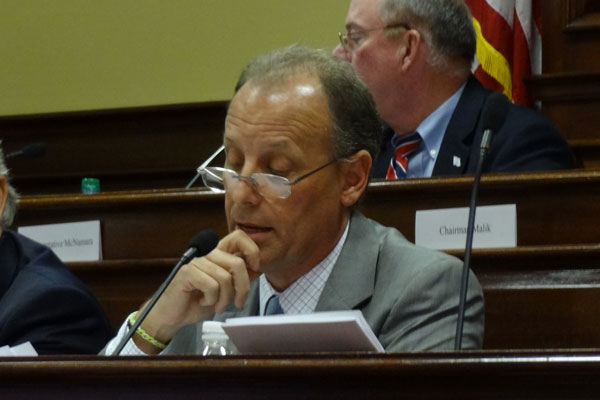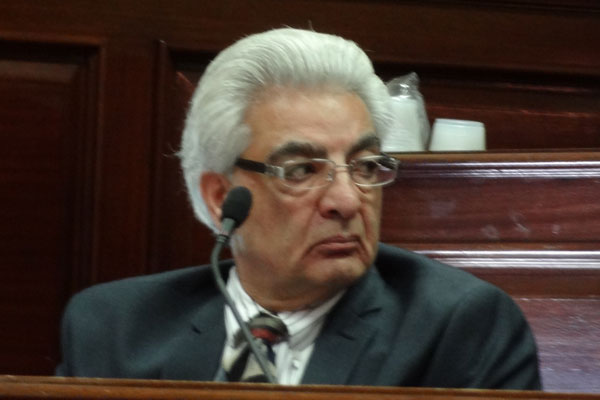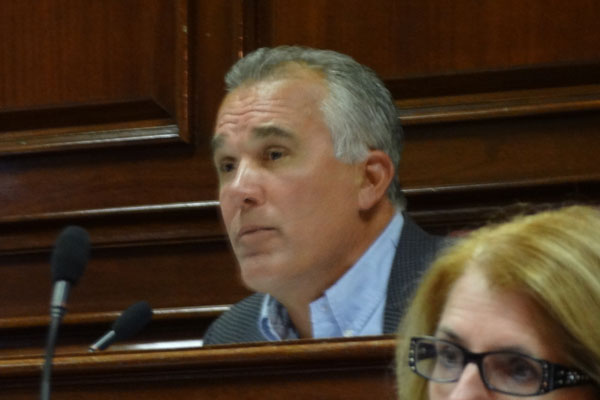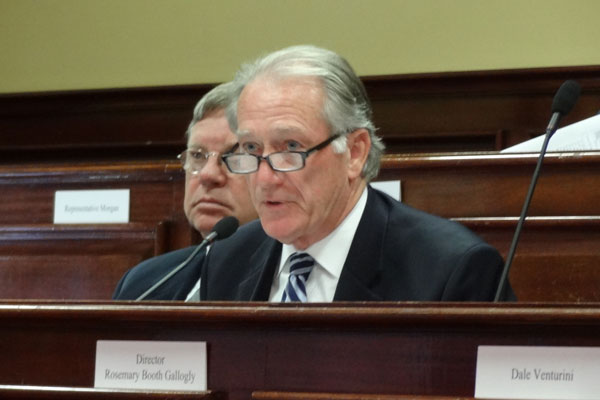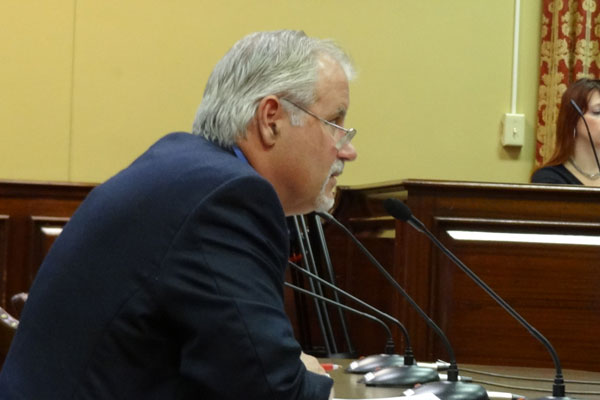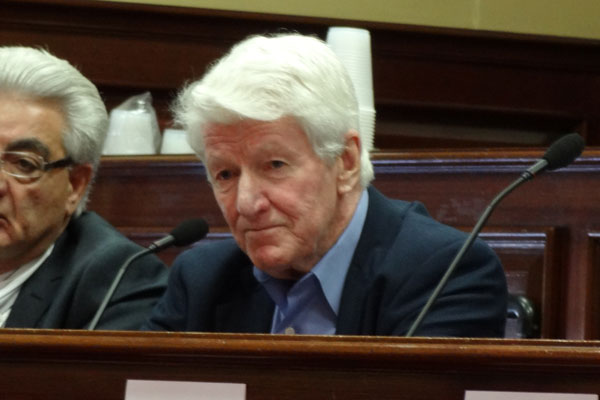09/30/13 – Commission to Study the Sales Tax Repeal
4:02 p.m.
And another (very data heavy) hearing of the legislative Commission to Study the Sales Tax Repeal legislation is about to begin. This time it’s in the Senate Judiciary chambers, so it feels like an actual hearing.
4:08 p.m.
As we wait (for some unknown reason), here’s the report I spent most of my day putting together for the RI Center for Freedom & Prosperity.
4:12 p.m.
Everybody here except Sen. Pearson and Rep. Morgan.
4:14 p.m.
Paul Dion, director of Revenue Analysis is introducing a book that lists all of the sales tax exemptions in the state of Rhode Island.
He says Rhode Island is one of 13 states that have no local sales taxes. “In many states, there’s an add-on at the local level.” Places in Arizona have a combined rate of up to 12%.
4:20 p.m.
The Center left Alaska out of our analysis because it’s peculiar, given its oil revenue. Dion is noting that Delaware has something that’s almost similar, because it’s such an incorporation hub for businesses that it raises “other” taxes, like on stock options. Because it’s the stability of its corporate law that makes Delaware so attractive, Rhode Island can’t really mirror it. [It’s going to take Rhode Island some decades of sanity to establish a reputation for stability in anything…]
Dion says of non-sales-tax states that “some of them have unique circumstances that allow them to forgo a sales tax, and others “make up for it in other ways.” I’d argue that point, inasmuch as he’s showing tax collections as a percentage of the total, and three of the four non-sales-tax states (excluding Alaska) simply have smaller budgets.
4:25 p.m.
As I’ve said, the problem with this sort of analysis (why a legislative commission is woefully inadequate) is that the data is so detailed and complex that one can make just about any point.
Commission member George Tamer, owner of Ace Hardware in Barrington, asks Dion what surprised him in the data.
The response: Rhode Island has a very well balanced revenue structure, meaning it’s spread across different taxes “generally that balance tends to be desirable because it allows for you to absorb hits.” (I’d point out that the non-sales-tax states tended to be more stable, revenue-wise, through the recession than Rhode Island.)
4:38 p.m.
Chairman Jan Malik is saying that the current tax regime just isn’t working and the purpose of this commission is to figure out what can be fixed, whatever it means for our rankings.
4:42 p.m.
John Simmons is giving the RIPEC report on the subject. Once again, the message is that it’s all very complicated, and we’re not so bad on the sales tax as the rate itself might suggest, absent an analysis of what is and is not taxed.
(Seems to me this answers a question that’s different from what Rep. Malik is asking. The rationale for eliminating the sales tax is not that it is abnormally high, in Rhode Island, but that it is the tax change that will have the greatest effect on improving the employment situation in Rhode Island.)
4:50 p.m.
By the way, it was more than worth the price of admission to come to this hearing in order to get a copy of an awesome report that Paul Dion put together for the commission, which analyzes the “cost” of tax exemptions… that is the money that the state “forgoes” by not taxing items at the 7%.
4:52 p.m.
Senator Bates asks if any states reimburse businesses for the administrative costs of collecting sales taxes. Dion says that some do — some on a percentage basis and some as flat fees.
Rep. Malik apologizes for only getting reports to the commission members now, and he expects the committee to “study hard” and ask a lot of questions at the next meeting.
4:55 p.m.
Mike Stenhouse from the RI Center for Freedom & Prosperity is the only person signed up to testify. He references a think-tank convention that he attended last week: “many other states are aggressively seeking reforms to improve their states’ competitiveness.”
He’s now referencing the harm to families of Rhode Island’s current budget approach. “We’re not just talking about stats and figures, but real people and real families affected by public policy.” “The status quo is not working.”
He notes that legislators and opinion leaders have the power to change this.
5:03 p.m.
Looking through Dion’s report, by the way, the greatest “forgone” sales tax is the one that RI doesn’t collect on “purchases used for manufacturing purposes,” which his report puts at $306 million per year. Food is a big one, too.
5:06 p.m.
Stenhouse is going through the report that we posted today, noting that non-sales-tax states manage to spend more per capita on precisely the things that the sales tax was implemented to fund, like education and infrastructure.
Drops the preview that the Tax Foundation will be coming out to testify before the commission in November.
5:09 p.m.
Stenhouse: “We all know, even though we can’t admit it legally, that we all consider going to New Hampshire to save money on our purchases. My kids do it; I don’t.”
5:10 p.m.
Rhode Island moment: Rep. McNamara notes that Stenhouse is a former neighbor in Warwick, and his parents are his constituents. He speaks of Maine shopping centers and asks if it’s true that they could have $2.2 billion more in annual revenue if their state had followed New Hampshire (or rather, not moved away by implementing a sales tax). It is.
McNamara says when he introduced legislation to match Massachusetts’s sales tax holidays, he heard from vendors all throughout Rhode Island who talked about the change in sales volume.
5:14 p.m.
George Tamer asks about the experience of states that eliminated their sales tax. Stenhouse specifies that it’s never been done. Tamer: “So there’s an opportunity to perhaps set a precedent.”
Paul DeRoche from the Chamber of Commerce (sitting in for Laurie White, who apparently had to leave) asks how Stenhouse would respond to those who simply blanch at the price tag of eliminating the sales tax revenue. Stenhouse responds that the status quo is not working, but that the RI-STAMP modeling tool suggests that much of that revenue will simply be made up by a healthier economy.
5:21 p.m.
Sen. Felag asks whether there’s an data on perhaps expanding exemptions and eliminating sales tax in a targeted fashion, to maximize the bang for the buck.
Stenhouse says it wouldn’t eliminate compliance costs for most businesses, but I’d suggest that such a strategy would be disruptive to the economy in a way that cancels any benefit from the state government’s perspective. Look at recent articles speaking about the “meds and eds” strategy perhaps not being the boon it was thought to be. Shifting the tax burden by reducing those sales taxes would have misapplied the reform’s investment.
The complexity of these questions is beyond the legislature (indeed, beyond any person): Do we free business inputs, or do we free the tourist industry. Do we target high-tech or basics for consumer savings?
Picking and choosing tax winners and losers also loses the simple marketing message that the state has no sales taxes.
5:28 p.m.
“It’s awfully funny to listen to all of yahs.” He’s talking about the loss of big industry in Rhode Island. “Those days are over with. People aren’t working in Warren unless they own their own business.”
5:34 p.m.
And done.

